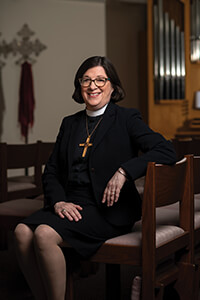The blurring of law and gospel
January 6, 2023
Martin Luther once said, “I felt that I had been born anew and that the gates of heaven had been opened. The whole of Scripture gained a new meaning. And from that point on the phrase ‘the justice of God’ no longer filled me with hatred, but rather became unspeakably sweet by virtue of a great love.”
Luther had been studying the Bible—Paul’s letter to the Romans to be exact—when he finally came to understand that it was not up to human beings to make themselves worthy in the eyes of a righteous God. Luther had tried—he quit his study of law, entered a monastery and was so rigorously observant that his health suffered. The word of God only seemed to bring condemnation. It tormented him.
But in an instant, all that changed. From hatred to love. Here was the gospel, the good news. We receive forgiveness of sin and become righteous before God by grace for Christ’s sake through faith. Thanks be to God!
This is a treasure, and it is the church’s unique and proper work to preach the gospel purely and to administer the sacraments according to the gospel. “It is also taught that at all times there must be and remain one holy, Christian church. It is the assembly of all believers among whom the gospel is purely preached and the holy sacraments are administered according to the gospel” (Augsburg Confession, Article VII, German translation). The church, of which we are a part, is the only institution on earth given this task.
The Augsburg Confession gives a clear explanation of the gospel: “Likewise, they teach that human beings cannot be justified before God by their own powers, merits, or works. But they are justified as a gift on account of Christ through faith …” (Augsburg Confession, Article IV, Latin translation).
We receive forgiveness of sin and become righteous before God by grace for Christ’s sake through faith. Thanks be to God!
I’m concerned that the Lutheran understanding of the word being both law and gospel, and that there is a distinction between law and gospel, is getting blurred. Some define the gospel as social justice—feeding the hungry, standing with the poor and marginalized, racial equity, justice for migrants, respect for the dignity of all people. These are all vitally important ministries in which this church must be engaged. But they aren’t the gospel. Rather, these works of justice and mercy flow from the liberation the gospel brings.
In November 1520, Martin Luther wrote his treatise On the Freedom of a Christian. In it he makes clear the distinction between law and gospel and between God’s work and our work. The gospel, God’s gift of grace, has set us free. Luther explains it this way: “Lord Jesus, you are my righteousness, just as I am your sin. You have taken upon yourself what is mine and given me what is yours” (Luther’s Works, 48:12-13). No one and nothing can take this away from us. No longer crushed by the weight of self-justification, but gloriously free by being bound to the righteousness of Christ, we are free to serve the neighbor.
Luther wrote: “I will do nothing in this life except what I see is necessary, profitable, and salutary to my neighbor, since through faith I have an abundance of all good things in Christ” (On the Freedom of a Christian).
Lutherans have been accused of quietism in the past. And I sense the current blurring of law and gospel is motivated out of an earnest desire to follow Jesus’ command to care for “the least of these” (Matthew 25:1-46). But we aren’t quietists. Our faith compels us to be active in the public square.
Jesus said, “I came that they may have life, and have it abundantly” (John 10:10). We don’t bring life or salvation. That is God’s work, and it has already been accomplished through the death and resurrection of Jesus. It is because of this life, this grace, this freedom that we human creatures are bold to stand with the marginalized and excluded.

